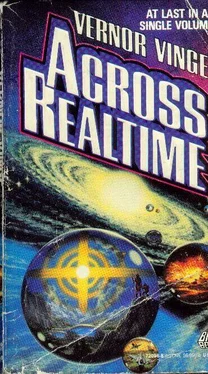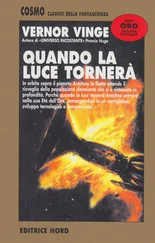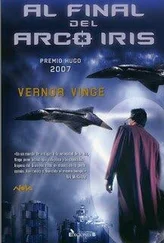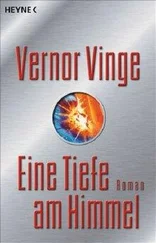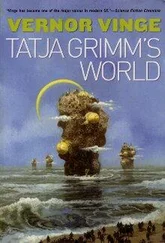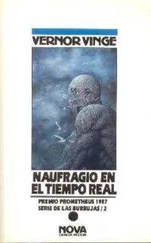Vernor Vinge - Across Realtime
Здесь есть возможность читать онлайн «Vernor Vinge - Across Realtime» весь текст электронной книги совершенно бесплатно (целиком полную версию без сокращений). В некоторых случаях можно слушать аудио, скачать через торрент в формате fb2 и присутствует краткое содержание. Жанр: Фантастика и фэнтези, на английском языке. Описание произведения, (предисловие) а так же отзывы посетителей доступны на портале библиотеки ЛибКат.
- Название:Across Realtime
- Автор:
- Жанр:
- Год:неизвестен
- ISBN:нет данных
- Рейтинг книги:4 / 5. Голосов: 1
-
Избранное:Добавить в избранное
- Отзывы:
-
Ваша оценка:
- 80
- 1
- 2
- 3
- 4
- 5
Across Realtime: краткое содержание, описание и аннотация
Предлагаем к чтению аннотацию, описание, краткое содержание или предисловие (зависит от того, что написал сам автор книги «Across Realtime»). Если вы не нашли необходимую информацию о книге — напишите в комментариях, мы постараемся отыскать её.
Across Realtime — читать онлайн бесплатно полную книгу (весь текст) целиком
Ниже представлен текст книги, разбитый по страницам. Система сохранения места последней прочитанной страницы, позволяет с удобством читать онлайн бесплатно книгу «Across Realtime», без необходимости каждый раз заново искать на чём Вы остановились. Поставьте закладку, и сможете в любой момент перейти на страницу, на которой закончили чтение.
Интервал:
Закладка:
The general -Avery couldn't see his name tag, and it probably didn't matter anyway - continued, "That's three thousand men, women, and children immediately dead, and God knows how many hundreds to die of radiation poison-ing in the months to come." He glared across the conference table at Avery and the assistants he'd brought to give his delegation the properly important image.
For a moment it seemed as though the officer had finished speaking, but in fact he was just catching his breath. Hamil-ton Avery settled back and let the blast roll over him. "You of the Peace Authority deny us aircraft, tanks. You have weakened what is left of the nation that spawned you until we must use force simply to protect our borders from states that were once friendly. But what have you given us in return?" The man's face was getting red. The implication had been there, but the fool insisted on spelling it out: If the Peace Authority couldn't protect the Republic from nuclear weapons, then it could scarcely be the organization it adver-tised itself to be. And the general claimed the Tucson blast was incontrovertible proof that some nation possessed nukes and was using them, despite the Authority and all its satel-lites and aircraft and bobble generators.
On the Republic's side of the table, a few heads nodded agreement, but those individuals were far too cautious to say aloud what their scapegoat was shouting to the four walls. Hamilton pretended to listen; best to let this fellow hang himself. Avery's subordinates followed his lead, though for some it was an effort. After three generations of undisputed rule, many Authority people took their power to be God-given. Hamilton knew better.
He studied those seated around the general. Several were Army generals, one just back from the Colorado. The others were civilians. Hamilton knew this group. In the early years, he had thought the Republic of New Mexico was the greatest threat to the Peace in North America, and he had watched them accordingly. This was the Strategic Studies Committee. It ranked higher in the New Mexico government than the
Group of Forty or the National Security Council - and of course, higher than the cabinet. Every generation, governments seemed to breed a new inner circle out of the older, which was then used as a sop to satisfy larger numbers of less influential people. These men, together with the President, were the real power in the Republic. Their "strategic studies" extended from the Colorado to the Mississippi. New Mexico was a powerful nation. They could invent the bobble and nuclear weapons all over again if they were allowed.
They were easy to frighten nonetheless. This Air Force general couldn't be a full-fledged member of the group. The NMAF manned a few hot-air balloons and dreamed of the good old days. The closest they ever got to modern aircraft was a courtesy flight on an Authority plane. He was here to say things their government wanted said but did not have the courage to spit out directly.
The old officer finally ran down, and sat down. Hamilton gathered his papers and moved to the podium. He looked mildly across at the New Mexico officials and let the silence lengthen to significance.
It was probably a mistake to come here in person. Talking to national governments was normally done by officers two levels below him in the Peace Authority. Appearing in person could easily give these people an idea of the true importance of the incident. Nevertheless, he had wanted to see these men close up. There was an outside chance they were involved in the menace to the Peace he had discovered the last few months.
Finally he began. "Thank you, General, uh, Halberstamm. We understand your anxiety, but wish to emphasize the Peace Authority's long-standing promise. No nuclear weapon has exploded in nearly fifty years and none exploded yesterday in Greater Tucson."
The general spluttered. "Sir! The radiation! The blast! How can you say-"
Avery raised his hand and smiled for silence. There was a sense of noblesse oblige and faint menace in the action. "In a moment, General. Bear with me. It is true: There was an explosion and some radiation. But I assure you no one besides the Authority has nuclear weapons. If there were, we would deal with them by methods you all know.
"In fact, if you consult your records, you will find that the center of the blast area coincides with the site of a ten-meter confinement sphere generated - " he pretended to consult his notes" -5 July 1997."
He saw various degrees of shock, but no questions broke the silence. He wondered how surprised they really were. From the beginning, he'd known there was no point in trying to cover up the source of the blast. Old Alex Schelling, the President's science adviser, would have put two and two together correctly.
I know that several of you have studied the open literature on confinement," and you, Schelling, have spent a good many thousand cautious man-hours out in the Sandia ruins, trying to duplicate the effect, "but a review is in order.
"Confinement spheres-bobbles-are not so much force fields as they are partitions, separating the in- and outside of their surfaces into distinct universes. Gravity alone can penetrate. The Tucson bobble was originally generated around an ICBM over the arctic. It fell to earth near its target, the missile fields at Tucson. The hell bomb inside exploded harmlessly, in the universe on the far side of the bobble's surface.
"As you know, it takes the enormous energy output of the Authority's generator in Livermore to create even the smallest confinement sphere. In fact, that is why the Peace Authority has banned all energy-intensive usages, to safeguard this secret of keeping the Peace. But once established, you know that a bobble is stable and requires no further inputs to maintain itself."
"Lasting forever," put in old Schelling. It was not quite a question.
"That's what we all thought, sir. But nothing lasts forever. Even black holes undergo quantum decay. Even normal matter must eventually do so, though on a time-scale beyond imagination. A decay analysis has not been done for confinement spheres until quite recently." He nodded to an assistant who passed three heavy manuscripts across the table to the NM officials. Schelling scarcely concealed his eagerness as he flipped past the Peace Authority Secret seal -the highest classification a government official ever saw-and began reading.
"So, gentlemen, it appears that-like all things-bobbles do decay. The time constant depends on the sphere's radius and the mass enclosed. The Tucson blast was a tragic, fluke accident."
"And you're telling us that every time one of the damn things goes, it's going to make a bang as bad as the bombs you're supposed to be protecting us from?"
Avery permitted himself to glare at the general. "No, I am not. I thought my description of the Tucson incident was clear: There was an exploded nuclear weapon inside that confinement."
"Fifty years ago, Mr. Avery, fifty years ago."
Hamilton stepped back from the podium. "Mr. Halberstamm, can you imagine what it's like inside a ten-meter bobble? Nothing comes in or goes out. If you explode a nuke in such a place, there is nowhere to cool off. In a matter of milliseconds, thermodynamic equilibrium is reached, but at a temperature of several million degrees. The innocent seeming bobble, buried in Tucson all these decades, contained the heart of a fireball. When the bobble decayed, the explosion was finally released."
There was an uneasy stirring among the Strategic Studies Committee as those worthies considered the thousands of bobbles that littered North America. Geraldo Alvarez, a presidential confidant of such power that he had no formal position whatsoever, raised his hand and asked diffidently, "How frequently does the Authority expect this to happen?"
Читать дальшеИнтервал:
Закладка:
Похожие книги на «Across Realtime»
Представляем Вашему вниманию похожие книги на «Across Realtime» списком для выбора. Мы отобрали схожую по названию и смыслу литературу в надежде предоставить читателям больше вариантов отыскать новые, интересные, ещё непрочитанные произведения.
Обсуждение, отзывы о книге «Across Realtime» и просто собственные мнения читателей. Оставьте ваши комментарии, напишите, что Вы думаете о произведении, его смысле или главных героях. Укажите что конкретно понравилось, а что нет, и почему Вы так считаете.
